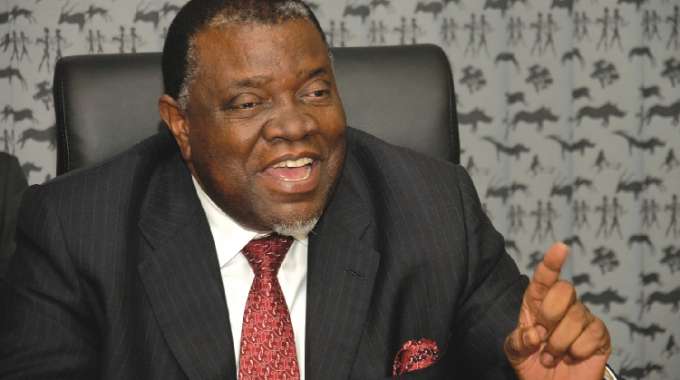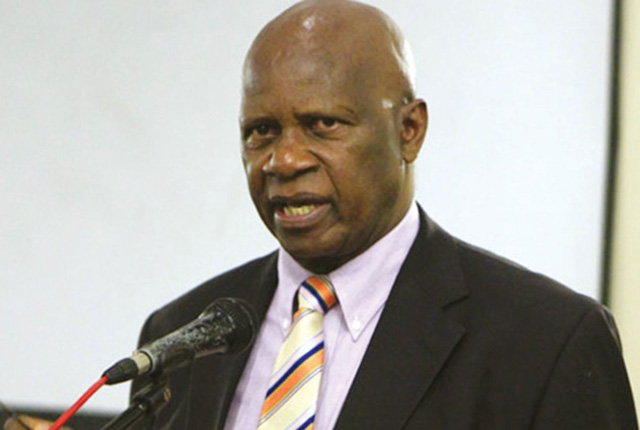Reduce reliance on imports, says President Geingob

Prosper Ndlovu Bulawayo Bureau—
Visiting Namibian President Cde Hage Geingob yesterday implored African governments and the private sector to aggressively champion industrialisation in their economies and curb over-reliance on raw commodity exports. In his address to mark the official opening of the 58th edition of the Zimbabwe International Trade Fair (ZITF) in Bulawayo, President Geingob said the challenges facing the continent and rising youth unemployment could only be addressed by harnessing regional linkages and pursuing a robust regional industrialisation agenda anchored on value addition and beneficiation.
He bemoaned the low intra-regional trade and reliance on imports from developed economies, which he blamed for the continued use of economic models that serve colonial interests.
“Trade between African governments has generally been low,” said President Giengob.
“This is so because our trading patterns have been aligned to service the requirements of former colonial powers and partly because many African countries essentially produce similar goods, mainly agricultural and mineral commodities,” he said.
“Little or no beneficiation takes place in many of our countries and the bulk of finished goods are imported from Europe and Asia. This must change. There is not a single advanced economy in the world today that did not go through the industrialisation process.
“African economies will be no different. To address burning challenges, in particular rising youth unemployment, we will have to expand our industrial base and manufacturing capabilities.”
Watch Video Below
President Geingob expressed optimism that Zimbabwe’s economy was poised to register robust growth on the back of good rains and the anticipated bumper harvest, which lays a solid foundation for growth in other processing sectors and attainment of food security. He said agricultural exhibitions at the ZITF demonstrated that the country was the bread basket of the region.
“Zimbabwe, as the bread basket of SADC, is poised to reap a bumper harvest this year,” he said.
“From what I have seen before we came here and touring the stands, particularly the agricultural sector, I must state that Zimbabwe is indeed the bread basket of SADC. This positive outlook should bolster our hopes and encourage our business people to get ready to capitalise on the opportunity represented by this development.”
Similarly, President Geingob said, the Namibian economy was recovering, presenting opportunities for trade and investment with Zimbabwe.
While Namibia recorded trade in goods worth about $13 billion in 2016, President Geingob said his country’s trade with Zimbabwe in the same period was only $24 million.
“This low level of trade presents a huge opportunity for the two countries,” he said.
President Geingob commended President Mugabe for taking the lead in advocating for an industrialised Africa.
He said it was under President Mugabe’s able leadership as chairman of SADC that the regional industrialisation policy and implementation framework was adopted in 2015.
Zimbabwe has already domesticated the value addition policy under Zim-Asset.
“We must work hard to ensure that this important roadmap does not collect dust on the shelf, but is implemented with a sense of urgency,” said President Geingob.
He stressed the need for regional economies to work together to derive economies of scale and high levels of competitiveness, which could not be attained at individual country level.
President Geingob called on Africa states to embrace regional economic integration, break regional barriers to trade and specialise on unique competitive advantages to create regional value chains that can compete globally.
He called for easy labour mobility.
“It is only through the unhindered movement in Africa that one day we will harness the full industrial capacity and capability of the economy,” said President Geingob.
He said Namibia had started working on enhancing ease of movement by abolishing visa requirements for all Africans holding diplomatic official passports and that ordinary travellers who seek visas were able to get them upon arrival.
To address economic inequality in the country, he said his government had adopted a programme code named “Harambee Prosperity Plan”, which aims to fast track implementation of empowerment programmes.
President Geingob challenged the private sector to lead economic development processes, saying the role of governments was to only provide a conducive macro-economic environment.
“It is up to the private sector to identify opportunities and turn those into viable businesses. You, the private sector, are the ultimate creators of wealth,” he said.
President Geingob warned businesses against seeking super or excessive profits, saying such an approach was not sustainable in the long run.
He commended Zimbabwe’s efforts to reform the easy of doing business to attract investment and urged the private sector to take advantage of the process, as well as utilise platforms like ZITF to cultivate, cooperate and further business gains.
“Together, Namibia, Zimbabwe and the rest of Africa can harness increased opportunities for industrial development. If we pull together with the private sector as Africa, we can make it,” said President Geingob.
The official opening of the fair was attended by President Mugabe, several Government officials, members of the diplomatic corps, the business community and the general public.










Comments